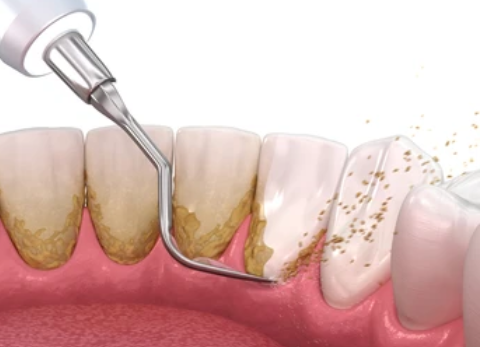Sachar Dental NYC
For SAME day / emergency appointments
Call (212) 752-1163
All the below content has been written by NYC Dentist, Dr. Sandip Sachar.
How Do I Remove Tartar From My Teeth?
- Professional Dental Cleaning: A procedure in which a dental hygienist or dentist removes tartar using specialized instruments from over the gumline.
-
Scaling and Root Planing: A deep-cleaning method may be required if there is tartar buildup below the gum line.

What Is Tartar?
Have you ever noticed a rough, yellowish buildup on your teeth that just won’t go away, no matter how much you brush? That’s tartar and it can seriously impact your oral health.
Tartar is a hardened, crusty mineral deposit that forms on and between your teeth. It starts as plaque, the soft, sticky film of bacteria that naturally forms on your teeth throughout the day. If not removed through proper brushing and flossing, plaque mineralizes into tartar, creating a rough surface that attracts more bacteria. The problem? Once tartar forms, regular brushing and flossing won't remove it—you'll need professional dental cleaning. Left unchecked, tartar can lead to serious issues like gum disease.
Tartar is sometimes called dental calculus. Unlike plaque, which can be removed with good oral hygiene, tartar requires professional dental intervention. If left untreated, tartar can cause cavities, gum disease, and persistent bad breath.
How Do You Know If You Have Tartar?
Tartar buildup is often noticeable and presents several signs, including:
- Yellow, brown, or black discoloration on the surface of teeth.
- A rough, crusty texture that makes teeth feel uneven.
- Chronic bad breath due to bacteria trapped within tartar.
- Red, swollen, or bleeding gums, indicating gum disease.
Can Tartar Cause Bad Breath?
Yes! The rough surface of tartar creates an ideal environment for bacteria, often leading to bad breath (halitosis). Some individuals may also experience an unpleasant taste in their mouth.
What Causes Tartar Formation?
- Inadequate brushing and flossing habits.
- Consumption of a diet high in sugars and starches promotes bacterial growth.
- Dry mouth conditions reduce saliva production, diminishing the mouth’s natural cleaning ability.
- Smoking and other tobacco use, increase bacterial growth and cause staining.
- Misaligned teeth or orthodontic appliances that make cleaning difficult.
Risks of Tartar Buildup
- Gingivitis: The earliest stage of gum disease, causing inflammation and bleeding.
- Periodontitis: A severe gum infection that can result in tooth loss.
- Cavities: Tartar traps bacteria and acids, increasing decay risk.
-
Chronic bad breath: Persistent halitosis despite regular brushing and mouthwash use.
If Tartar Has Led to Gum Disease
- Scaling and Root Planing to remove tartar deposits from beneath the gums.
- Antibiotic Therapy to target bacterial infections.
- Surgical Treatments in advanced cases where gum disease has caused significant tissue or bone loss.
How To Prevent Tartar Buildup?
Preventing tartar accumulation is essential for maintaining oral health. Effective preventive measures include:
- Brushing teeth twice daily with fluoride toothpaste.
- Using an electric toothbrush can be more effective at removing plaque.
- Flossing daily to clean between teeth and prevent plaque buildup.
- Limiting sugary and starchy foods helps reduce plaque formation.
- Avoiding smoking and tobacco products.
- Scheduling regular dental check-ups and professional cleanings every six months.
What Happens If I Ignore Tartar?
- Progressive gum disease, leading to tooth and bone loss.
- Increased risk of systemic infections linked to periodontal disease.
- Pain and discomfort associated with untreated cavities and gum inflammation.
How Often Should I See My Dentist?
The American Dental Association recommends visiting a dentist at least twice a year for a professional cleaning. However, individuals with a history of tartar buildup, gum disease, or other dental concerns may need more frequent visits as determined by their dentist.
Take Charge of Your Dental Health Today!
Wondering if you have tartar buildup? A professional cleaning is the best way to keep your smile healthy. Don't wait—schedule your appointment with NYC dentist, Dr Sachar, today to protect your smile!
Read MORE about How To Properly Brush and Floss on our services page.
Tartar (Dental Calculus): Tips to Remove Tartar Buildup
Sachar Dental NYC
20 East 46th Street
Rm 1301
(Between 5th Ave & Madison Ave)
New York, NY 10017
212-752-1163
https://www.sachardental.com/
drsachar@sachardental.com